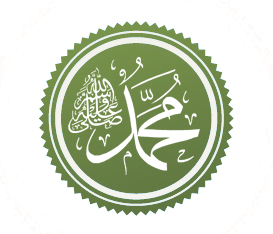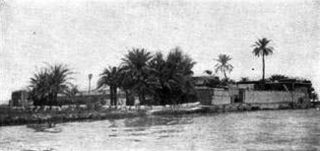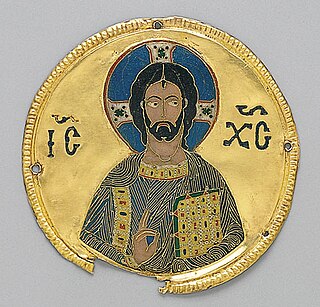Related Research Articles
ʿIlm al-Kalām, usually foreshortened to Kalām and sometimes called Islamic scholastic theology, is the study of Islamic doctrine ('aqa'id). It was born out of the need to establish and defend the tenets of Islamic faith against doubters and detractors. A scholar of Kalām is referred to as a mutakallim, and it is a role distinguished from those of Islamic philosophers, jurists, and scientists.

Ibn Warraq is the pen name of an anonymous author critical of Islam. He is the founder of the Institute for the Secularisation of Islamic Society and used to be a senior research fellow at the Center for Inquiry, focusing on Quranic criticism. Warraq is the Vice-President of the World Encounter Institute.
A polemic is contentious rhetoric that is intended to support a specific position by forthright claims and undermining of the opposing position. Polemics are mostly seen in arguments about controversial topics. The practice of such argumentation is called polemics. A person who often writes polemics, or who speaks polemically, is called a polemicist. The word is derived from Ancient Greek πολεμικός (polemikos) 'warlike, hostile', from πόλεμος (polemos) 'war'.

The Bosnian Church was a Christian church in medieval Bosnia and Herzegovina that was independent of and considered heretical by both the Catholic and the Eastern Orthodox hierarchies.

Why I Am Not a Muslim, a book written by Ibn Warraq, is a critique of Islam and the Qur'an. It was first published by Prometheus Books in the United States in 1995. The title of the book is a homage to Bertrand Russell's essay, Why I Am Not a Christian, in which Russell criticizes the religion in which he was raised.
Abu al-Hasan Ahmad ibn Yahya ibn Ishaq al-Rawandi, commonly known as Ibn al-Rawandi, was an early Persian scholar and theologian. In his early days, he was a Mu'tazilite scholar, but then rejected the Mu'tazilite doctrine. Afterwards, he became a Shia scholar; there is some debate about whether he stayed a Shia until his death or became a skeptic, though most sources confirm his eventual rejection of all religion and becoming an atheist. Although none of his works have survived, his opinions had been preserved through his critics and the surviving books that answered him. His book with the most preserved fragments is the Kitab al-Zumurrud.
Apology of al-Kindi is a medieval theological polemic. The word "apology" is a translation of the Arabic word رسالة, and it is used in the sense of apologetics. The work makes a case for Christianity and draws attention to perceived flaws in Islam. It is attributed to an Arab Christian referred to as Abd al-Masih ibn Ishaq al-Kindi. This Al-Kindi is otherwise unknown, and is clearly different from the Muslim philosopher Abu Yûsuf ibn Ishâq al-Kindī.

Petrus Alphonsi was a Jewish Spanish physician, writer, astronomer, and polemicist, who converted to Christianity in 1106. He is also known just as Alphonsi, and as Peter Alfonsi or Peter Alphonso and was born Moses Sephardi). Born in Islamic Spain, he mostly lived in England and France after his conversion.

During the Early Middle Ages, Christendom largely viewed Islam as a Christological heresy and Muhammad as a false prophet. By the Late Middle Ages, Islam was more typically grouped with heathenism, and Muhammad was viewed as inspired by the devil. A more relaxed or benign view of Islam only developed in the modern period, after the Islamic empires ceased to be an acute military threat to Europe. See Orientalism.
Abner of Burgos was a Jewish philosopher, a convert to Christianity and polemical writer against his former religion. Known after his conversion as Alfonso of Valladolid.

Uzair is a figure mentioned in the Quran, Surah At-Tawba, verse 9:30, which states that he was revered by the Jews as "the son of God". Uzair is most often identified with the biblical Ezra. Modern historians have described the reference as "enigmatic", since such views have not been found in Jewish sources. Islamic scholars have interpreted the Quranic reference in different ways, with some explaining that it alluded to a specific group of Jews.

Heresy is any belief or theory that is strongly at variance with established beliefs or customs, in particular the accepted beliefs of a church or religious organization. The term is usually used in reference to violations of important religious teachings, but is also used of views strongly opposed to any generally accepted ideas. A heretic is a proponent of heresy.

The Eastern Roman (Byzantine) imperial church headed by Constantinople continued to assert its universal authority. By the 13th century this assertion was becoming increasingly irrelevant as the Eastern Roman Empire shrank and the Ottoman Turks took over most of what was left of the Byzantine Empire. The other Eastern European churches in communion with Constantinople were not part of its empire and were increasingly acting independently, achieving autocephalous status and only nominally acknowledging Constantinople's standing in the Church hierarchy. In Western Europe the Holy Roman Empire fragmented making it less of an empire as well.

Christianity in the 12th century was marked by scholastic development and monastic reforms in the western church and a continuation of the Crusades, namely with the Second Crusade in the Holy Land.
The following outline is provided as an overview of and topical guide to theology:
Sefer Nizzahon Yashan "The (old) Book of Victory" is an anonymous 13th Century Jewish apologetic text originating in Germany. The name "old" is attached to distinguish the work from Yom-Tov Lipmann-Muhlhausen of Prague's work of the same name, Sefer Nizzahon, written between 1401–1405. A modern edition was published by Mordechai Breuer in 1978, and a critical edition by David Berger in 2008.
Jewish polemics and apologetics in the Middle Ages were texts written to protect and dissuade Jewish communities from conversion to Christianity, or more rarely to Islam. The terms polemics and apologetics may be distinguished but may also be considered somewhat subjective. A smaller number of proselytizing text also exists intended to convert Christians, or more rarely Muslims, to Judaism.

Jay Smith is a Christian evangelist, apologist and polemicist. Since 1983, he has been a full-time missionary with the Brethren in Christ Mission with a focus on apologetics and polemics among the Muslims of London.
Amulo Lugdunensis served as Archbishop of Lyon from 841 to 852 AD. As a Gallic prelate, Amulo is best known for his letters concerning two major themes: Christian–Jewish relations in the Frankish kingdom and the Carolingian controversy over predestination. He was ordained as archbishop in January 841.

Daniel Judah Lasker is an American-born Israeli scholar of Jewish philosophy. As of 2017, he is Professor Emeritus in the Department of Jewish thought at Ben Gurion University of the Negev.
References
- ↑ John Victor Tolan Medieval Christian perceptions of Islam Page 420 2000 "For medieval Christians. Islam presented a series of disquieting challenges. Epic poets imagined Muslim ... either of demonic hostility or of chivalric ideals, while polemics wrote theological refutations, often defaming the Prophet."
- ↑ Muslim-Christian polemic during the Crusades R. Y. Ebied, David Richard Thomas, Shams al-Dīn Muḥammad ibn Abī Ṭālib Dimashqī - 2005 "This edition and English translation of the fourteenth century correspondence between Cypriot Christians and the Muslim Ibn Ab lib al-Dimashq is a significant example of later medieval Christian-Muslim polemic that affords an invaluable "
- ↑ David Richard Thomas Early Muslim polemic against Christianity: Abū ʻĪsá al-Warrāq's "Against the Trinity" Muḥammad ibn Hārūn Warrāq, - 2002
- ↑ Oddbjorn Leirvik - 2010 "As a post-Christian religion, which has included much of the Christian heritage, Islam challenges Christianity by ... and argue against the reliability of the Christian sources, culminating in the medieval polemic of Ibn Hazm.
- ↑ The ambivalence of interreligious experience: Riccoldo da Monte Page 147 Rita George Tvrtkovic, University of Notre Dame - 2007 "Medieval Theology of Islam: Method Amos Funkenstein describes four kinds of medieval Christian anti-Jewish polemic: the classic dialogi cum Judaeis argument; rationalistic polemic attempting to “prove” Christian doctrine; attacking the attacking the Talmud; using the Talmud to demonstrate the truth of Christianity.458 To an extent, these four methods of argumentation are similar to those used by medieval Christians against Islam. This should not be surprising, ...
- ↑ Philippe Bobichon,"Juifs et convertis engagés dans les controverses médiévales", in D. Iancu-Agou (dir.), Les juifs méditerranéns au Moyen âge : culture et prosopographie, Paris, Cerf, 2010, pp. 83-125